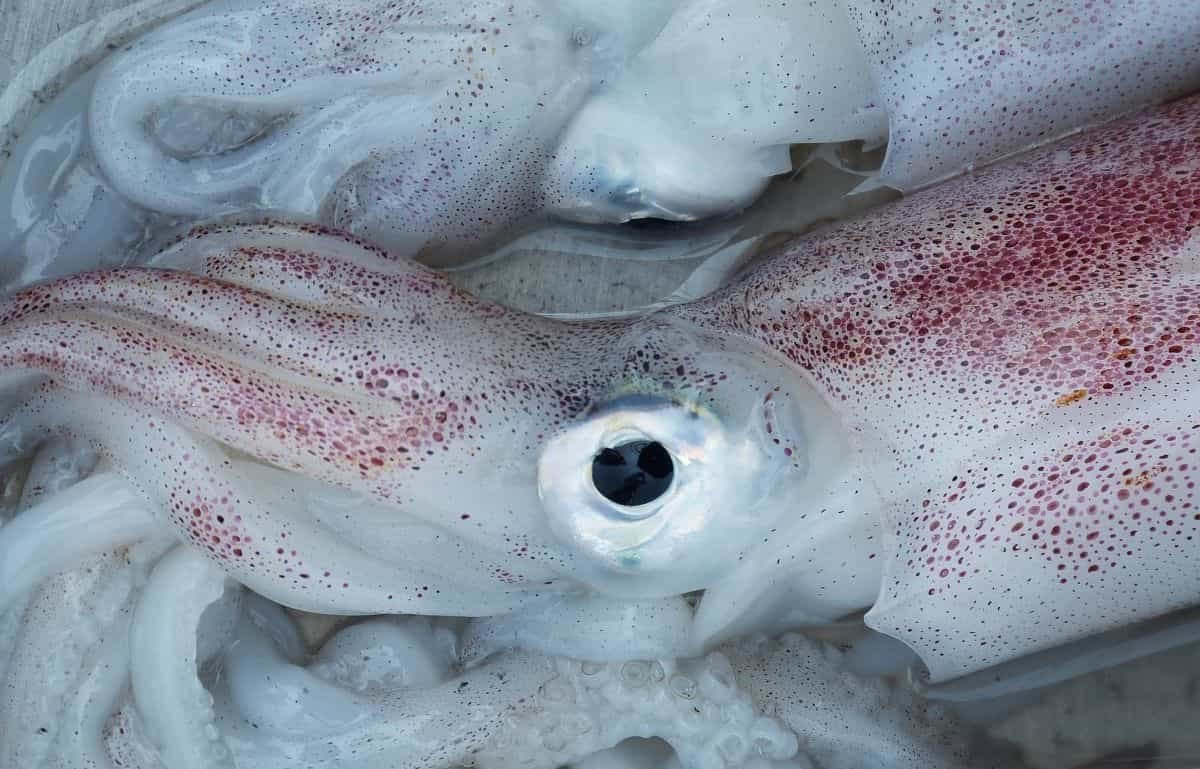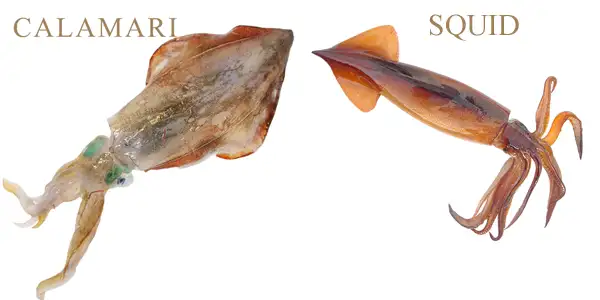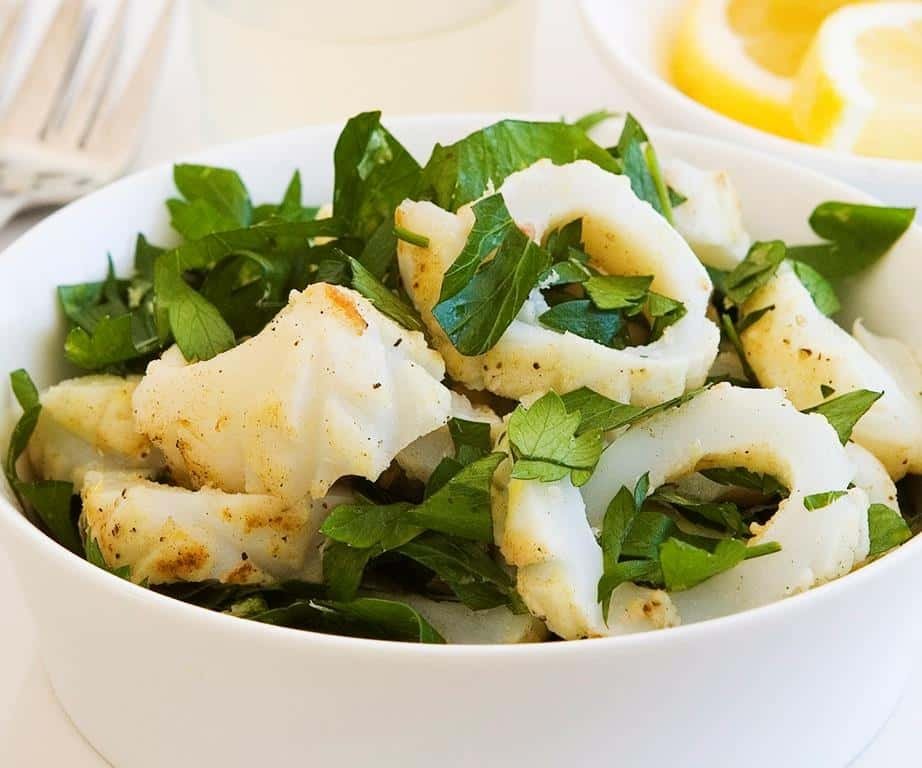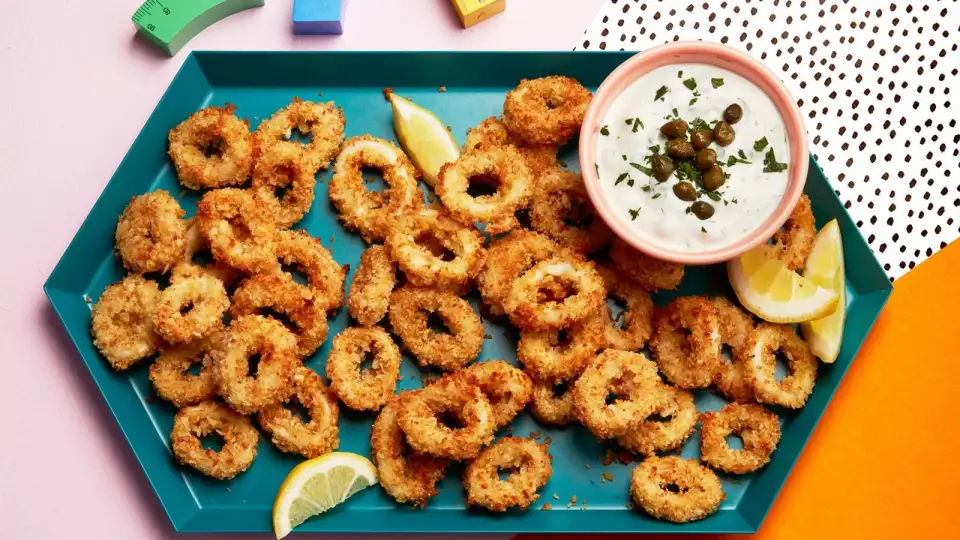(Calamari) Squid Health Benefits, Nutrition Facts, And Potential Risks

Squid, often referred as calamari, is a popular seafood option throughout the world. From crispy squid fritti to grilled squid skewers, this versatile dish may be served in a variety of ways. But did you know that squid is not only tasty, but it is also high in nutrients that has many health benefits?
In this article, we’ll look at the nutritional facts of squid, as well as its possible health advantages and any potential hazards linked with eating this shellfish.
So, whether you’re a squid fan or just curious about this unique food, keep reading to learn everything you need to know about calamari!
But before we jump in squid health benefits lets understand what is the difference between squid and calamari.
Squid Vs. Calamari
Squid and calamari are actually two different types of marine animals, but they are often used interchangeably in cooking and may look quite similar.

Both belong to the cephalopod family, including octopus and cuttlefish – all in the same family.
The main physical difference between squid and calamari is the shape of their bodies.
Squid typically have longer, thinner bodies with a pointed head and two fins on the side of their bodies.
Calamari, on the other hand, have shorter, rounder bodies with a broader head and a single fin that runs around the body.
Some support that Squid and calamari are the same thing. Calamari is also known as Squid in Spanish and Italian. Some restaurants have embraced the term “calamari,” and you’ll commonly see it on menus instead of “squid.”
Regarding taste and texture, calamari is generally considered to be softer and milder than squid which has a chewy texture.
Calamari is also usually smaller in size than squid, making it a popular choice for appetizers and dishes where smaller, bite-sized pieces are desired.
As for cooking, both squid and calamari can be prepared in several ways, including grilling, frying process, or sautéing. Calamari is generally considered to be more tender and milder in flavor than squid, and is often smaller in size.
A popular ingredient in many types of cuisine, both squid and calamari can be prepared in a variety of ways. They are both a popular ingredient in Mediterranean and Asian cuisine, and can be found in dishes like calamari fritti, squid ink pasta, or stir-fried squid with vegetables.
In summary, squid and calamari are two different types of marine animals with distinct physical differences, but they are often used interchangeably in cooking and come from the same family of seafood.
Squid Health Benefits
Here are the potential health benefits of Squid meat:
1. A Good Source of Protein
Squid is a great source of high-quality protein, which is important for building and repairing muscles, tissues, and cells in the human body itself.
A 3-ounce serving of squid or calamari can contain around 15-20 grams of protein, making it a good choice for athletes and active individuals.
There’s a lot protein in calamari waiting for you bodybuilding athletes who wish to increase your protein intake.
2. Contains Large Amounts of Choline
Calamari is an excellent source of choline, a nutrient that is essential for our bodies to function properly. Choline is a water-soluble vitamin-like nutrient that is similar to the B vitamins.
One of the primary benefits of choline is that it plays a critical role in brain health. Choline is a key component of acetylcholine, a neurotransmitter that is essential for memory, mood, and other cognitive functions.
Studies have found that a choline-deficient diet can lead to memory impairment and other cognitive problems. [1]
In addition to brain health, choline has also been shown to support liver health and function, improve athletic performance, and reduce the risk of birth defects.
Choline is essential for the formation of cell membranes, and it helps to transport fats and cholesterol out of the liver, which can improve liver function and reduce the risk of liver disease. [2]
3. Calamari Contains Significant Amounts of Copper
Both Calamari and squid contain significant amounts of copper. Copper is an essential mineral that our bodies need to carry out a number of important functions. It is involved in the production of red blood cells, the formation of connective tissues, and the absorption of iron.
A 3-ounce serving of cooked squid contains around 0.8 milligrams of copper, which is about 40% of the recommended daily intake for adults.
Now, while copper is found in many different foods, calamari and squid are particularly rich sources of this important mineral.
In the blood health in addition to its role in the production of red blood cells and connective tissues, copper is also involved in the maintenance of the immune system and the production of energy.
It is an important component of enzymes that are involved in these processes, and a deficiency in copper can lead to a number of health problems.
4. Is Low in Calories
Squid is also a low-calorie food, which makes it a great option for those watching their weight.
A 3-ounce serving of squid or calamari typically contains only about 75-85 calories, making it a filling yet light addition to meals.
5. Contains essential vitamins and minerals
Squid is also rich in essential vitamins and minerals, such as vitamin c, vitamin B12, vitamin E, zinc, iron, and selenium.
These nutrients are important for maintaining good health and preventing deficiencies that can lead to a range of health problems.
6. May help reduce blood pressure
Some studies have suggested that consuming boiled squid alone may help reduce high blood pressure due to its high potassium content. [3]
Potassium is an important mineral that helps regulate blood pressure and keep the heart healthy. [4]
7. It is high in omega-3 fatty acids
Squid is a rich source of omega-3 , which are essential for brain function, heart health, and reducing inflammation in the body.
Omega-3s have also been linked to a reduced risk of depression and anxiety because they may quickly penetrate the cell membrane of the brain and interact with mood-related chemicals within the brain, making them a crucial nutrient for mental health. [5]
It is also worth noting that the omega-3 in squid and calamari have been shown to improve cognitive function and reduce the risk of cognitive decline in older adults.
These fatty acids are important for maintaining healthy brain function and may help prevent conditions like Alzheimer’s disease and dementia.
Ingestion of omega-3 increases learning, memory, cognitive well-being, and blood flow in the brain.[4]
Related: Xtend Life Omega 3 QH Premium Review & Consumer Reports
8. May help prevent anemia
Squid is also a good source of iron, which is essential for the production of red blood cells.
Regular consumption of squid or calamari may help prevent anemia, a condition characterized by a deficiency in red blood cells that can lead to fatigue, weakness, and other health problems.
9. May improve eye health
Calamari is rich in vitamin A, which is important for maintaining good eye health. Vitamin A has been linked to a reduced risk of macular degeneration and cataracts, two common eye conditions that can lead to vision loss.
11. Can help with inflammation reduction
The anti-inflammatory properties of omega-3 fatty acids found in squid and calamari oil may help reduce inflammation in the body and improve overall health.
Chronic inflammation has been linked to a range of health problems, including heart disease, diabetes, and cancer.
Related: 8 Best Astaxanthin Supplements For Skin And Inflammation
12. May improve skin health
Calamari is rich in vitamin E, which is essential for healthy skin. Vitamin E has been shown to help reduce the appearance of fine lines and wrinkles, improve skin texture, and protect the skin from damage caused by environmental stressors like pollution and UV radiation.
13. May help improve heart health
Again, the omega-3 fatty acids in calamari have been shown to reduce triglycerides, lower blood pressure, and improve the overall health of heart .
These benefits make calamari a heart-healthy food choice that may help reduce the risk of heart disease, the leading cause of death worldwide.
Calamari Nutrition Information
Here’s a table with Squids Key Nutritional benefits. If you would like me to expand this table with more squid nutrition data, just send me a message here.
| Nutrient | Serving Size | % Daily Value* |
|---|---|---|
| Total Calories | 85 | 4% |
| Protein | 16.2 g | 32% |
| Total Fat | 1.1 g | 2% |
| Saturated Fat | 0.3 g | 1% |
| Carbohydrates | 2.6 g | 1% |
| Fiber | 0 g | 0% |
| Sugars | 0 g | 0% |
| Cholesterol | 222 mg | 74% |
| Sodium | 44 mg | 2% |
| Potassium | 251 mg | 7% |
| Calcium | 17.5 mg | 2% |
| Iron | 0.6 mg | 3% |
| Magnesium | 34.5 mg | 9% |
| Phosphorus | 222 mg | 22% |
| Zinc | 1.2 mg | 8% |
| Copper | 0.8 mg | 40% |
| Selenium | 44 mcg | 63% |
| Vitamin B12 | 3.0 mcg | 50% |
| Vitamin E | 0.3 mg | 1% |
| Vitamin K | 3.5 mcg | 4% |
| Omega-3s | 0.2-0.5 g | — |
*Percent daily values are based on a 2,000 calorie diet.
👉 General nutrition advice: It’s worth noting that nutritional values may vary depending on the specific type of squid and how it is prepared. However, this table should give you a good idea of how much a nutrient you can expect to find in a typical serving of cooked squid.
Potential Side Effects of Calamari
Here are some potential side effects associated with eating calamari eating shellfish or squid:
Shellfish allergy – allergic reaction: Some people may be allergic to calamari or squid, which can cause symptoms such as hives, itching, swelling, and difficulty breathing. If you have a known shellfish allergy or allergy to seafood, or any allergic reactions, it’s important to avoid calamari and squid altogether.
Mercury contamination: Like many types of seafood, calamari and squid may contain mercury, which can be harmful if consumed in high amounts. While the risk of mercury poisoning is generally low for most people, pregnant women and young children are advised to limit their intake of seafood that may contain mercury. Based on mercury levels in commercial seafood between 1990 and 2012, the average mercury content of squid was 0.024 PPM (based on 36 samples). (source)
High cholesterol: Calamari and squid are relatively low in fat, but they do contain high amounts of cholesterol. For this reason, people with high blood cholesterol levels or a history of heart disease might get instructed by their nutritionists to limit their intake of calamari and other high-cholesterol foods.
Foodborne illness: As with any type of seafood, there is a risk of foodborne illness associated with consuming calamari or squid. To reduce this risk, it’s important to buy fresh seafood from a reputable source, store it properly, and cook it thoroughly before eating.
Environmental concerns: Some types of calamari and squid are overfished or caught using unsustainable fishing methods, which can harm marine ecosystems and contribute to environmental problems. Squids harvested for commercial purposes are often captured offshore, sometimes far out at sea. Numerous different squid species are caught and consumed. The European squid, Argentina shortfin squid, giant flying squid, and Japanese flying squid were the most often captured squid species in 2002. The giant flying squid fishery is the most prolific in the world right now.
Fried Squid Is Not as Healthy: Fried squid is often not as healthy as other preparations of calamari due to the added fat and calories from the frying process. When calamari is deep-fried, it absorbs a significant amount of oil, which increases its calorie and fat content. In addition, the breading or batter used to coat the calamari before frying may contain additional calories, sodium, and carbohydrates. Consuming fried squid in moderation as part of a balanced diet is still possible, but it’s important to be aware of the potential drawbacks.
Cooking With Squid
Cooking with squid can be a fun and delicious way to incorporate more seafood into your diet. Here are two recipes that you can try at home:
Broiled Calamari with Lemon and Parsley

Ingredients:
1 pound squid, cleaned and cut into rings
2 tablespoons olive oil
2 cloves garlic, minced
Salt and pepper to taste
Juice of 1/2 lemon
2 tablespoons fresh parsley, chopped
Instructions:
Preheat your broiler to high.
In a bowl, mix together the olive oil, minced garlic, salt, and pepper.
Add the squid rings to the bowl and toss to coat them evenly with the oil and spices.
Arrange the squid rings in a single layer on a broiler pan.
Broil for 2-3 minutes per side, or until the calamari is just cooked through and lightly browned.
Remove the calamari from the oven and transfer it to a serving dish.
Drizzle the lemon juice over the top and sprinkle with fresh parsley.
Serve immediately and enjoy!
Faux-Fried Calamari (Oven)

Ingredients:
1 pound squid, cleaned and cut into rings
1/2 cup all-purpose flour
1/2 teaspoon salt
1/4 teaspoon black pepper
2 eggs, beaten
1 cup panko breadcrumbs
Cooking spray
Instructions:
Preheat your oven to 425°F.
In a bowl, mix together the flour, salt, and black pepper.
Place the beaten eggs in a separate bowl.
Place the panko breadcrumbs in a third bowl.
Dip each squid ring first in the flour mixture, then in the egg, and finally in the panko breadcrumbs, pressing the breadcrumbs onto the squid to help them adhere.
Place the breaded calamari rings on a baking sheet that has been sprayed with cooking spray.
Spray the tops of the calamari rings with cooking spray.
Bake for 10-12 minutes, or until the calamari is cooked through and the breadcrumbs are golden brown.
Serve immediately with your favorite dipping sauce and enjoy your faux-fried calamari or enjoy fried squid!
Frequently asked Questions
What has more protein chicken or calamari?
When it comes to protein content, chicken is generally higher than calamari. However, calamari is still a good source of protein, especially for those who prefer seafood over meat.
Related: Octopus Vs Chicken – Which is Healthier
Is calamari a lean protein?
Yes, calamari is considered a lean protein because it is low in fat and calories.
Is fried calamari good for you?
No, it is not good for you. Fried squid or calamari is not the healthiest option as it can be high in calories, saturated fat, and sodium. It’s best to consume calamari grilled, broiled, or baked to retain its health properties.
Is calamari as healthy as fish
Yes, calamari is considered as relatively healthy food as fish. There are fish that are healthier than calamari – in terms of nutrient content of course. Calamari is a type of seafood, just like fish, and is a good source of protein, omega-3 fatty acids, vitamins, and minerals. However, the exact health properties may vary depending on the type of fish and the preparation method.
What is the healthiest way to eat calamari?
The healthiest way to eat calamari is by grilling, broiling, or baking it instead of frying. These methods will help retain its nutritional benefits and keep the calorie and fat content low.
Is squid high in good cholesterol content or bad cholesterol?
Squid does not contain any saturated fat, which is a type of fat that can raise your cholesterol levels. Additionally, the cholesterol in squid is primarily in the form of HDL or “good” cholesterol, which can actually help to lower your risk of heart disease.
Are squid and calamari the same?
Essentially no – they come from different families of cephalopods. But because Squid and calamari are are similar in taste, texture and nutrition, they’ re often regarded as the same.
Are fried calamari rings healthy?
Fried calamari rings are not the healthiest option because they are typically coated in batter and deep-fried, which increases their calorie, saturated fat content, and sodium content. It’s best to consume calamari in a grilled or baked form to retain its nutritional value.
Can I eat squid if I have high cholesterol?
As I mentioned earlier in this article, a 3-ounce (85-gram) serving of squid contains 222 milligrams of cholesterol, which is 74% of the daily recommended intake of cholesterol. So, in that sense, squid can be considered relatively high in cholesterol compared to other seafood.
However, squid is still considered a low-fat and low-calorie protein source, and it does not contain any saturated fat, which is a type of fat that can raise your cholesterol levels. Additionally, the dietary cholesterol used in squid is primarily in the form of HDL or “good” cholesterol, which can actually help to lower your risk of heart disease.
How often should you eat squid?
It is recommended to consume seafood, including raw squid (or uncooked squid)only, at least two times a week to reap its health benefits. However, it’s important to vary your seafood choices to get a diverse range of nutrients.
Is calamari OK on a diet?
Calamari can be included in a balanced diet as it is a low-calorie and low-fat protein source that is also high in nutrients like omega-3 fatty, essential amino acids, vitamins, and minerals. However, it’s important to consume it in a healthy preparation method, such as grilling or baking, to maintain its nutritional value.
Bottom Line
In conclusion, squid (calamari) is a highly nutritious food that is packed with essential nutrients such as protein, vitamins, and minerals.
It is a great source of choline, which is important for brain and liver health, and it also contains copper, which supports healthy blood vessels and immune function.
While calamari can be a healthy addition to your diet, it is important to be aware of potential risks, such as allergies and high cholesterol levels, especially if consumed in excess or prepared in a way that is high in calories and unhealthy fats.
“Good” food contributes to our well-being while “Bad” food, drains our bodies from energy.
Overall, if consumed in moderation and prepared in a healthy way, calamari can be a tasty and beneficial addition to your diet.
Read Also
